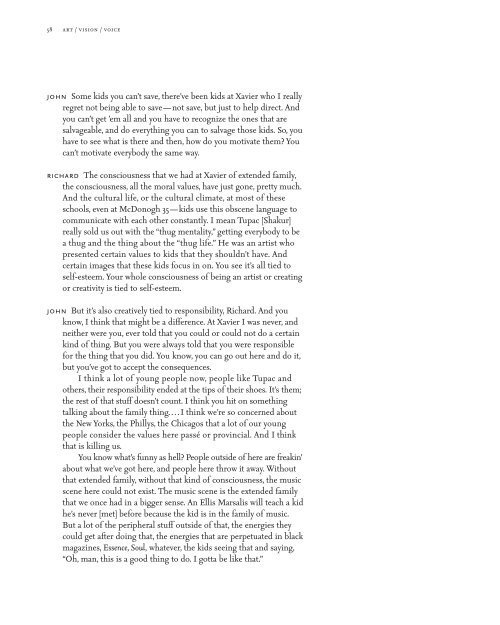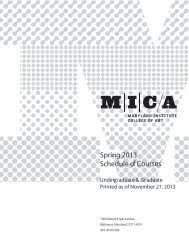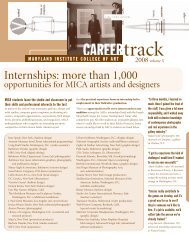art/vision/voice - Maryland Institute College of Art
art/vision/voice - Maryland Institute College of Art
art/vision/voice - Maryland Institute College of Art
You also want an ePaper? Increase the reach of your titles
YUMPU automatically turns print PDFs into web optimized ePapers that Google loves.
58 <strong>art</strong> / <strong>vision</strong> / <strong>voice</strong><br />
john Some kids you can’t save, there’ve been kids at Xavier who I really<br />
regret not being able to save—not save, but just to help direct. And<br />
you can’t get ’em all and you have to recognize the ones that are<br />
salvageable, and do everything you can to salvage those kids. So, you<br />
have to see what is there and then, how do you motivate them? You<br />
can’t motivate everybody the same way.<br />
richard The consciousness that we had at Xavier <strong>of</strong> extended family,<br />
the consciousness, all the moral values, have just gone, pretty much.<br />
And the cultural life, or the cultural climate, at most <strong>of</strong> these<br />
schools, even at McDonogh 35—kids use this obscene language to<br />
communicate with each other constantly. I mean Tupac [Shakur]<br />
really sold us out with the “thug mentality,” getting everybody to be<br />
a thug and the thing about the “thug life.” He was an <strong>art</strong>ist who<br />
presented certain values to kids that they shouldn’t have. And<br />
certain images that these kids focus in on. You see it’s all tied to<br />
self-esteem. Your whole consciousness <strong>of</strong> being an <strong>art</strong>ist or creating<br />
or creativity is tied to self-esteem.<br />
john But it’s also creatively tied to responsibility, Richard. And you<br />
know, I think that might be a difference. At Xavier I was never, and<br />
neither were you, ever told that you could or could not do a certain<br />
kind <strong>of</strong> thing. But you were always told that you were responsible<br />
for the thing that you did. You know, you can go out here and do it,<br />
but you’ve got to accept the consequences.<br />
I think a lot <strong>of</strong> young people now, people like Tupac and<br />
others, their responsibility ended at the tips <strong>of</strong> their shoes. It’s them;<br />
the rest <strong>of</strong> that stuff doesn’t count. I think you hit on something<br />
talking about the family thing. . . . I think we’re so concerned about<br />
the New Yorks, the Phillys, the Chicagos that a lot <strong>of</strong> our young<br />
people consider the values here passé or provincial. And I think<br />
that is killing us.<br />
You know what’s funny as hell? People outside <strong>of</strong> here are freakin’<br />
about what we’ve got here, and people here throw it away. Without<br />
that extended family, without that kind <strong>of</strong> consciousness, the music<br />
scene here could not exist. The music scene is the extended family<br />
that we once had in a bigger sense. An Ellis Marsalis will teach a kid<br />
he’s never [met] before because the kid is in the family <strong>of</strong> music.<br />
But a lot <strong>of</strong> the peripheral stuff outside <strong>of</strong> that, the energies they<br />
could get after doing that, the energies that are perpetuated in black<br />
magazines, Essence, Soul, whatever, the kids seeing that and saying,<br />
“Oh, man, this is a good thing to do. I gotta be like that.”
















